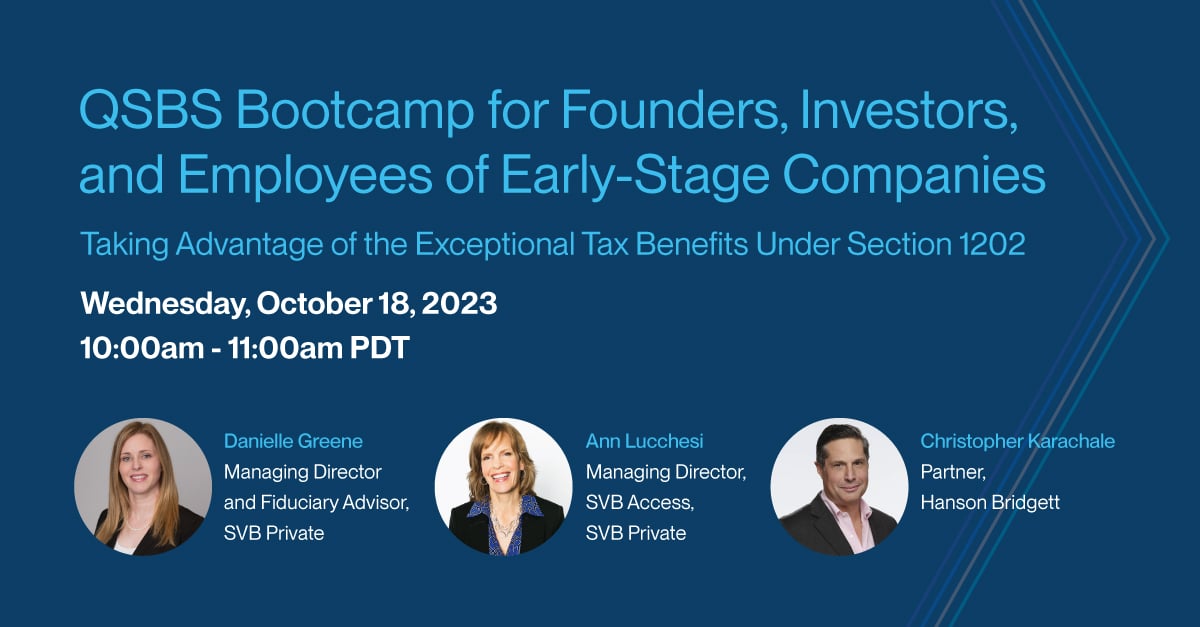Beginning January 1, 2023, Massachusetts law raises the estate tax threshold from $1 million to $2 million. Massachusetts residents with estates worth more than $2 million are now taxed only on the amount over the new $2 million threshold. The law also reduces the Massachusetts short-term capital gains rate from 12.5% to 8.5%. A retroactive law Although enacted in October, 2023, this estate law is retroactive and applies to estates of individuals who passed away on or after January 1, 2023. The changes should have a significant effect high-net-worth individuals from executives to founders to venture capital professionals and their heirs. If you’re a resident of Massachusetts who meets the income criteria, it’s a good time to contact your tax advisor to discuss how the new law may impact your existing estate plans. For help managing your estate, contact us today. For more information regarding changes to the tax code and its impact on your financial strategies, reach out to your SVB Private advisor or visit svb.com/private today.Key takeaways
A bill signed into law by Governor Maura Healey, provides significant estate and income tax relief for high-net-worth residents of Massachusetts. The bill, enacted on October 3, 2023, makes several changes to the Massachusetts tax code, most significantly doubling the Massachusetts estate tax threshold from $1 million to $2 million.
The increased threshold includes additional savings for Massachusetts families with estates worth more than $2 million. Under the old law, once an estate hits the $1 million threshold the entire estate was subject to the tax. The new law specifies that only the portion of an estate over the $2 million threshold is taxed by the state. The savings comes about through a $99,600 uniform estate tax credit for estates worth more than $2 million.
Related read: Latest tax update: Understanding and mitigating the Massachusetts Millionaires Tax
The uniform credit does away with the “cliff effect” imposed on estates valued at just over $2 million as the estate is no longer taxed on the funds beneath the new threshold amount. For example, a $2.2 million estate is now only taxed on $200,000, not the full $2.2 million estate value. Estates valued at less than $2 million are not subject to the new law.
One stipulation worth noting is the Massachusetts estate tax exemption is not portable to a surviving spouse upon the death of the first spouse. In other words, the portion of the tax exemption not used is not transferable to the surviving spouse.
In addition to the estate tax revisions, the bill reduces the state's short-term capital gains rate from 12% to 8.5%. There is one caveat to note regarding short- and long-term capital gains though. As of 2023, Massachusetts residents with annual incomes over $1 million are subject to the so-called millionaires’ tax. The tax, that went into effect in 2023, applies a 4% surtax to the portion of income over $1 million. The Massachusetts tax rate on long-term capital gains is unchanged at 5%.
Related read: 10 Practical tactics that can help reduce your tax bill
Find anything about our product, search our documentation, and more. Enter a query in the search input above, and results will be displayed as you type.
Searching... 
MANAGING TAXES
Substantial estate and income tax legislation enacted in Massachusetts

What’s popular
The views expressed in the article are those of the author and/or person interviewed and do not necessarily reflect the views of Silicon Valley Bank, a division of First-Citizens Bank and First Citizens BancShares, Inc. The materials on this website are for informational purposes only, are subject to change and do not take into account your particular investment objective, financial situation or need. Since each client’s situation is unique, you should consult your financial advisor and/or tax planning professional before acting on any information provided herein.















